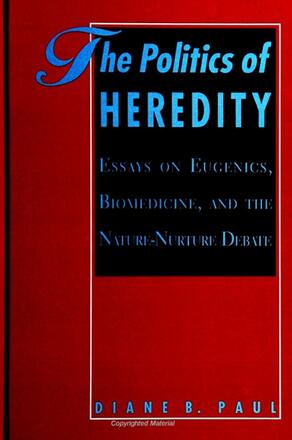
The Politics of Heredity
Essays on Eugenics, Biomedicine, and the Nature-Nurture Debate
Alternative formats available from:
Explores the political forces underlying shifts in thinking about the respective influence of heredity and environment in shaping human behavior, and the feasibility and morality of eugenics.
Description
The essays collected in The Politics of Heredity explore the political factors underlying shifts in thinking about the role of nature and nurture in shaping human behavior, and about the desirability and feasibility of controlling human reproduction. They ask why many assumptions that were simply taken for granted as late as the 1950s and '60s came to be considered fundamentally mistaken in the 1970s and '80s. They also suggest that some apparent shifts in thinking were not as deep as they may seem, and that changes in rhetoric may obscure the stability of core underlying beliefs.
Diane B. Paul is Professor, Department of Political Science, University of Massachusetts at Boston.
Reviews
"The essays are concise, intelligent, and well written. A couple are already minor classics among historians of science. What is most remarkable about them is their challenging of conventional wisdom. Most people believe that eugenics was attached only to right-wing Nazi-like causes; Paul shows that there were important left-leaning threads in the movement. Most people believe that 'good science' overcame 'bad eugenics;' Paul shows that many eugenicists were up to snuff on their science, and that political events had far more to do with the eventual discrediting of the movement. I must say that when I first heard her present her paper on 'Did Eugenics Rest on an Elementary Mistake?' the experience was actually thrilling. In a single stroke, Paul demolished one of the most sacred cows of eugenics historiography—and brilliantly." — Robert N. Proctor, Pennsylvania State University
"I like the consistent focus on the relationship between science and politics, and the ties between historical and contemporary debates. Without reducing science to politics, the author shows, through historical examples, the importance of politics and ideology in the field of eugenics and genetics. This is especially interesting in light of the current debates over social constructivism in science studies, and the increased market involvement in science." — Dorothy Nelkin, New York University